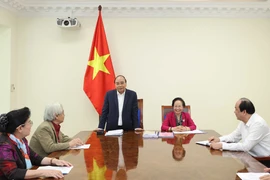 HCM City Open University has signed with Hanoi Open University to develop VMOOCs. (Photo courtesy of HCM City Open University)
HCM City Open University has signed with Hanoi Open University to develop VMOOCs. (Photo courtesy of HCM City Open University) Ho Chi Minh City OpenUniversity, for instance, last weekend launched Vietnam’s massive open onlinecourses platform, called VMOOC, with more than 40 free courses in fields suchas business administration, finance-banking, law, foreign languages andothers.
The university is co-operatingwith Hanoi Open University to develop further VMOOCs.
Dr Phan Thi Ngoc Thanh,director of the ELearning Center at the HCM City OpenUniversity, said that courses last for four to six weeks and are open toanyone.
Course participantsonly need a computer with an internet connection, or a smartphone orother mobile devices, to take part in these courses anywhere and at anytime.
Integrated lessons betweentheory and practice are offered. The courses are based on standardsfrom the US Quality Matters, a leading global organisationpromoting quality assurance in online and innovative digital teaching andlearning environments.
Prof Nguyen Minh Ha, Rector ofthe HCM City Open University, said: “E-learning is being stronglydeveloped in the country. This development is the inevitable trend ofthe 4.0 technology revolution era.”
“Online training is graduallyasserting the importance of meeting people’s learning needs anywhere and at anytime,” Ha added.
“VMOOCs will provide freeonline courses to spread knowledge to the community,” he said.
VMOOC is a digitalplatform that meets goals of the country’s project "DevelopingDigitalized Vietnamese Knowledge Systems" which has been carried out since2018.
The aim is to build a datafoundation and disseminate knowledge in socio-economic fields and scienceand technology to create conditions for the community to contribute, share andexploit, he added.
Deputy Minister of Educationand Training Nguyen Van Phuc said: “The development of MOOCs around theworld is the premise and the driving force for Vietnam to move towards. Vietnam'seducational development now and in future cannot be separated from theapplication of technology in the implementation process.
Besides traditionally trainingprograms, the ministry welcomes massive open online training models likeVMOOCs because they contribute to realising the Party and State’s policyto reform the open education system, creating learning conditions foreveryone in the country,” Phuc added.
He asked otheruniversities in the country to develop VMOOCs to diversify content andprogrammes so that all people have an opportunity to access highereducation.
Vu Thi Tu Anh, Deputy Directorof the Continuing Education Department under the Ministry ofEducation and Training, said: “We have to improve people's knowledge andensure educational opportunities for everyone.”
Universities should have theresponsibility to develop open materials to help everyone have accessto higher education as other countries do, Anh said.
“Studying is not only doneto obtain a degree, but improve knowledge and skills forworking. It is a daily living need. Each Vietnamese person should takeadvantage of this open material source,” she added.
VMOOCs help ensure that no oneis left behind in the country, she added.
Anh said the ministrywas setting up a legal framework to recognise lifelong learning.
Truong Tien Tung, Rector of theHanoi Open University, said: “We will continue to co-operate with otheruniversities toward the goal of developing an open educational ecosystemcontributing to Vietnam’s learning society.”
In Southeast Asia, Singaporeand Malaysia developed an open education system very early. As aresult, Malaysia increased the number of people with access to highereducation from 10 percent in 2010 to 33 percent in 2018. Malaysia's goal is toincrease the rate to 50 percent by 2030. /.





























